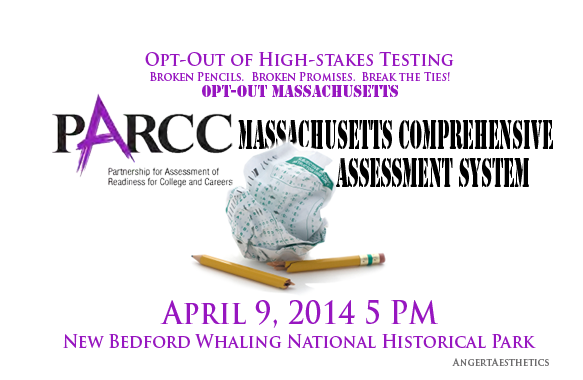Graphic; Opt-Out Massachusetts Comprehensive Assessment System/AngertAesthetics
Originally Published by Ricardo Rosa | March 16, 2014 | Download Flyer Opt-Out Massachusetts
I often hear that parental voices are needed in our educational system. Your response to this letter will determine whether or not you truly mean to include the voices of families in the reform of New Bedford’s schools. Of course, by “include,” I don’t mean acting as tour guides in schools or serving on advisory boards where one’s decision-making power is only symbolic.
Last year, on the day that MCAS was to be administered, my son was sick. He insisted that he wanted to attend school to take the test. He opened the test booklet and proceeded to answer test items when his teacher noticed that something was wrong. She sent him to the nurse, who called me. She stated: “he is clearly not well, but he opened the test booklet and risks having his test invalidated if he is sent home. We’ll have him sit then send him back to the classroom to take the test. After the test we’ll send him home.” I was appalled.
Ultimately, my son returned to take the MCAS, despite the early onset of the flu and my resistance. He felt compelled to test given the pressures. I don’t mean to insinuate that nurses in our schools are incompetent. I think they perform quite well and would perform stellar if the system was adequately funded. What I do mean to say is that the regime of high-stakes testing in our schools is deeply disturbing and inhumane!
I write this letter to express my intent to opt my children out of high-stakes testing, whether the test is the MCAS, PARCC, or any other hip acronym that comes along in the shape of a high-stakes test designed to oppress, standardize, anaesthetize, and ultimately suffocate students. I publicize this letter because it’s not only my children that concern me. My children usually do well. High scores on high-stakes tests do not prove that true learning is occurring. Countless educational research has concluded that the use of high-stakes testing narrows the curriculum and encourages test preparation as a substitute for engaged learning. High-stakes tests are also deviance-producing mechanisms.
A number of school systems across the country have been exposed for cheating and unethical practices due to the pressures of high-stakes testing. They are, in short, becoming Enron. Furthermore, our continuous focus on scoring well evades more important public dialogue about funding inequities and the root cause of educational disengagement – poverty. Allowing testing corporations to continue reaping billions of dollars in profit from public education only exacerbates the problem.
Any administrator, school committee member, or school functionary still standing before students, teachers, and families touting the virtues of high-stakes testing should be ashamed. And, if you know that it’s wrong but remain silent, you’re complicit in educational malpractice.
Furthermore, subjecting English Language Learners to the MCAS and the PARCC after only having been in the country for one year is immoral. Emergent bilingual students are 9 times more likely to drop out of high school than their peers. These tests are part of the problem. In addition, a high percentage of students with disabilities are not meeting graduation requirements as a result of these tests.
Countless educational researchers have concluded that measuring teacher effectiveness and school quality through high-stakes test scores is unreliable and unethical. Evaluating teachers in this manner does very little to improve the profession. Rather, it encourages great teachers to resign.
I strongly believe in accountability and high-expectations of all students, teachers and administrators. However, high-stakes tests are about securing low expectations. Portfolios, performance based, and other forms of authentic assessments are more educationally sound. Standardized tests also have their place, but they should not be in the form of high-stakes.
I encourage readers to read the
I look forward to a public response.
Ricardo D. Rosa












Teachers in my district were told that should we have an emergency during state testing (earthquake, fire, etc..) to abandon the normal procedure of leaving the doors unlocked so the response team can quickly get to each room to search for injured kids. If an emergency occurs during the test, it is more important to lock the door prior to leaving due to test security. Yes, this is what we were told. The safety and security of the test is more important than the safety and security of the children. You have experienced it and so have I.